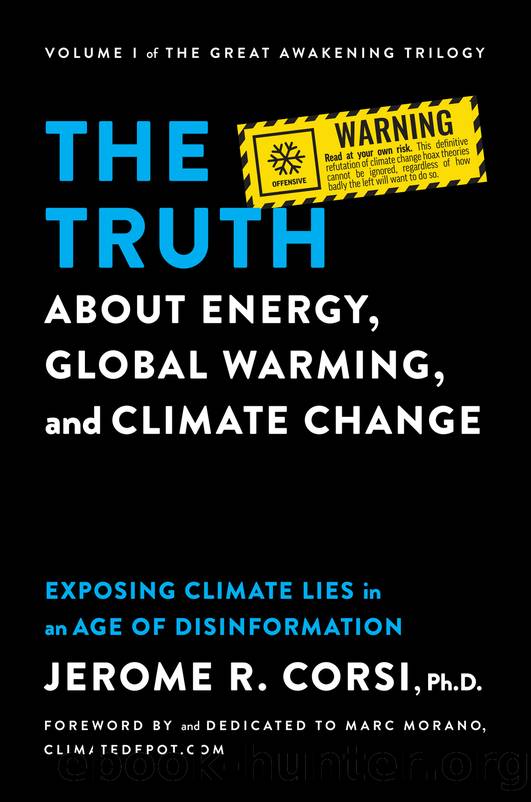The Truth about Energy, Global Warming, and Climate Change by Unknown

Author:Unknown
Language: eng
Format: epub
Publisher: Post Hill Press
Published: 2022-10-15T00:00:00+00:00
CHAPTER 9
Abiotic Oil
Biogenic versus Abiogenic Oil, The Fischer-Tropsch Process and Synthetic Oil, J.F. Kenney and the Russian-Ukrainian School, Thomas Gold and the Deep Hot Biosphere, Deep-Sea Hydrothermal Vents, Resolving the âPetroleum Paradox,â Fossil Fuel, Kerogen, and Biogenic Oil Chemistry, Fractures in Basement Rock, Offshore Drilling and Deep-Earth Hydrocarbons, Extraterrestrial Hydrocarbons, and CO2 Emissions from Deadwood Decomposition
It is generally accepted that petroleum is derived from the remains of organic life, but many uncertainties exist concerning the processes involved.
âHollis D. Hedberg, Petroleum Geologist, 19641
The capital fact to note is that petroleum was born in the depths of the earth, and it is only there that we must seek its origin.
âDmitri Mendeleev, LâOrigine du pétrole, 18772
The theory of the abyssal abiogenic origin of petroleum confirms the presence of enormous, inexhaustible resources of hydrocarbons in our planet and allows us to develop a new approach to methods for petroleum exploration and to reexamine the structure, size, and location of the worldâs hydrocarbon reserves.
âVladimir Kutcherov and Vladilen Krayushkin, 20103
THERE ARE TWO PARADIGMS CENTRAL to understanding the IPCCâs argument demonizing anthropogenic CO2. The first is that CO2 is a greenhouse gas humans must bring under control, despite being a trace chemical compound in the atmosphere. The second is the idea that hydrocarbon fuels are fossil fuels that we must stop burning, even though the IPCC views hydrocarbon fuels as depleting resources that will soon be exhausted by increased human consumption. The two concepts are linked. We must stop burning hydrocarbon fuels because oil, coal, and natural gas all emit CO2, and CO2 is a significant cause in producing catastrophic climate change. IPCC adherents insist a consensus of scientists holds both ideas as accurate. IPCC adherents, therefore, ridicule and scorn those of us who argue that we can safely and productively burn hydrocarbon fuels, as well as those who say CO2 is not a significant driver of Earthâs temperature.
The purpose of this chapter is to argue that natural hydrocarbon fuels found fully formed in the earth are abiotic, i.e., not made up of organic, biological material.4 This chapter will also clarify that hydrocarbon fuels degassing through deep-sea hydrothermal vents and deep-earth fissures are an essential feature of Earthâs carbon cycle long before the first signs of life appeared on the planet in the form of deep-earth microorganisms. The carbon cycle starts in Earthâs core, not with biogenic decay. Conventionally trained petroleum geologists will find the idea of abiotic oil hard to accept, much as petroleum geologists demonized for decades anyone who dared suggest that peak oil was a tautology, not proven science. So far in this book, we have demonstrated the complexity of Earthâs weather and climate. Because we understand that Earthâs weather and climate are both chaotic and subject to catastrophic change, then we must also recognize that we live on a planet whose environment is beyond our control. We will conclude this chapter by arguing that decarbonizing by restricting or significantly reducing the use of hydrocarbon fuels will have detrimental effects on the life-supporting nature of the carbon cycle itself.
Download
This site does not store any files on its server. We only index and link to content provided by other sites. Please contact the content providers to delete copyright contents if any and email us, we'll remove relevant links or contents immediately.
The Secret History by Donna Tartt(19086)
The Social Justice Warrior Handbook by Lisa De Pasquale(12190)
Thirteen Reasons Why by Jay Asher(8909)
This Is How You Lose Her by Junot Diaz(6885)
Weapons of Math Destruction by Cathy O'Neil(6279)
Zero to One by Peter Thiel(5801)
Beartown by Fredrik Backman(5754)
The Myth of the Strong Leader by Archie Brown(5507)
The Fire Next Time by James Baldwin(5442)
How Democracies Die by Steven Levitsky & Daniel Ziblatt(5218)
Promise Me, Dad by Joe Biden(5153)
Stone's Rules by Roger Stone(5087)
A Higher Loyalty: Truth, Lies, and Leadership by James Comey(4960)
100 Deadly Skills by Clint Emerson(4924)
Rise and Kill First by Ronen Bergman(4788)
Secrecy World by Jake Bernstein(4752)
The David Icke Guide to the Global Conspiracy (and how to end it) by David Icke(4717)
The Farm by Tom Rob Smith(4507)
The Doomsday Machine by Daniel Ellsberg(4490)
